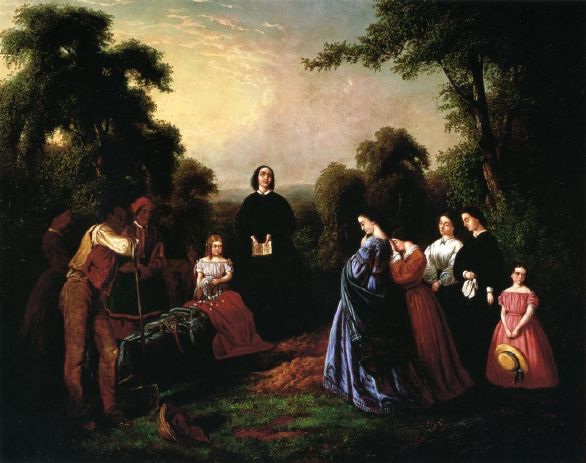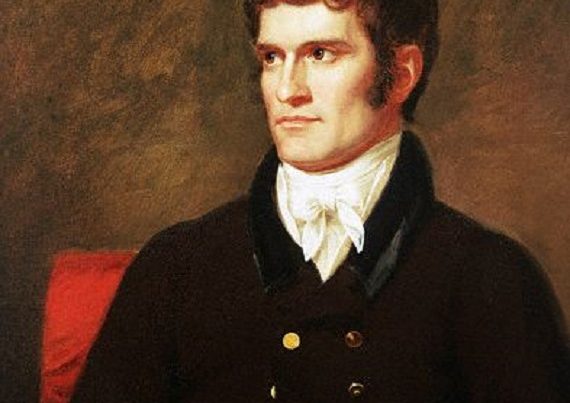Owen Wister’s novel Lady Baltimore is the story of a Northern man spending time in South Carolina around 1905. He is not your typical arrogant Yankee, but openly acknowledges the modern decay he sees in the North and is sympathetic to the South. He is staying in a boarding house with a variety of guests; they include Juno, an elderly Southern lady who lived during the war, a young Southern poetess not much older than himself, and a Northern lady from Boston.
One evening after dinner the guests are treated to a reading by the poetess entitled ‘Ode for the Daughters of Dixie’. Wister’s character, who is initially amused at the earlier sparring between the Northern and Southern ladies, has a realization during the reading of the poem because of its sober content and the mixed company in which it is read. This is how he describes the experience:
“Whatever gayety had filled me when the Boston lady had clashed with Juno was now changed to deprecation and concern. Indeed, I myself felt almost as if I were being physically struck by the words, until more bewilderment took possession of me and after bewilderment, a little, a very little, light, which, however rapidly increased.
We were the victors, we the North, and we had gone upon our own way with songs and rejoicing – able to forget, because we were the victors. We had our victory; let the vanquished have their memory. But here was the cry of the vanquished, coming after forty years. It was the time which at first bewildered me; Juno had seen the war, Juno’s bitterness I could comprehend, even if I could not comprehend her freedom in expressing it, but the poetess could not be more than a year or two older than I was; she had come after it was all over. Why should she prolong such memories and feeling?
But my light increased as I remembered she had not written this for us, and that if she had not seen the flames of war, she had seen the ashes: for the ashes I had seen myself here in Kings Port, and had been overwhelmed by the sight, forty years later, more overwhelmed than I could possibly say to Mrs. Gregory St. Michael, or Mrs. Weguelin, or anybody.”[i]
We are also here long after The War is over so why do we write? Why do we continue to share the ideas and tell the stories of the vanquished South? I submit that although it is not even possible for any of us to be acquainted with someone who witnessed the flames of this war, we too have seen the ashes. Not everyone does. Many revel in the grandeur of the empire and the progression of technology and manners which they believe are raising us to new heights of sophistication. But those of us with eyes to see have a solemn obligation to keep alive the truth and values that are nearly obliterated in today’s reconstructed America. We who have enough sensitivity to feel the pain created by that conflict, and sufficient knowledge to discern the source of our present disaster must continue to enlarge the memory of our people so that hope for a restoration remains.
Today we are suffering the full aftermath of the policies the Lincoln administration set in motion during his war against American citizens. We are horrified at the attempts to restrict gun ownership, the violations of privacy and personal volition, and the outright theft being labeled as “debt forgiveness” or “cares money”. Granted, the sentiments of centralization go back farther and can be identified in the writings of some of the founding generation, but Lincoln is the one who sought to permanently enforce nationalism and equality with the sword by total war.
Mark Royden Winchell at the end of his essay “Trashing Mount Rushmore” links the disastrous acts of presidential administrations through the last two centuries with their precedents in the atrocious measures enacted by Abraham Lincoln and his radical republican cronies. One of the most dramatic examples he uses is to compare the odious treatment of Congressman Clement L. Vallandigham, who opposed Lincoln’s unconstitutional war, with the internment of Japanese-American citizens during World War II. Without these precedents, Winchell argues, the door to subsequent assaults on freedom would have remained closed, at least for a little longer. He astutely warns,
“Once the use of extra-constitutional sanctions against American citizens is widely accepted, we cannot be certain that only the obviously guilty will suffer.”[ii]
Of this we have daily proof! The current administration leaves us aghast with its boldness in stripping away from Americans every semblance of freedom and independence promised in the Constitution as it was presented to the states. It cannot be disputed that the principles so passionately advocated by men like Patrick Henry lie in ashes at our feet. I have seen the ashes and like Wister, am more overwhelmed than I can say. Will the South ever rise again?
My late mentor, Stephen Pratt, found his calling to teach history while studying the bible. He felt that he should follow the example of Moses in relating to his people their history so that they could remember what was important and have the wisdom not to repeat their errors. No matter the censorship, opposition, or criticism that will come from attempting to teach the truth, historians with integrity must continue to teach real American history. [iii]
In his Rise and Fall of the Confederate Government, President Jefferson Davis left us this charge,
“Much of the past is irremediable; the best hope for a restoration in the future to the pristine purity and fraternity of the Union, rests on the opinions and character of the men who are to succeed this generation: that they may be suited to that blessed work, one, whose public course is ended, invokes them to draw their creed from the fountains of our political history, rather than from the lower stream, polluted as it has been by self-seeking place-hunters and by sectional strife.”[iv]
Davis also said,
“The principle for which we contend is bound to reassert itself, though it may be at another time and in another form.”
That time is now. If we listen to the cry of the vanquished through the study of unpolluted history, we may be able to resurrect that divine principle of sovereignty without which we will eventually live on our knees.
In Richard Weaver’s words,
“Things which are eternally right in the mind of God may be wickedly perverted in the world, but the perversion must not go unopposed….Part of the duty of chivalry is to serve the eternal verities.”[v]
May we boldly continue to oppose the perversion of our heritage, lest the cry of the vanquished be extended well beyond the Southern states.
******************
[i] Wister, Owen. Lady Baltimore, Nashville, TN: J. S. Sanders & Company, 1992.
[ii] Winchell, Mark Royden. Confessions of a Copperhead: Culture and Politics in the Modern South, Columbia, South Carolina: Shotwell Publishing, 2022, pg. 57.
[iii] Pratt, Stephen. “How and Why to Study History – Stephen Pratt – LL 1 of 9.” YouTube, uploaded by ldsconservative, 17 April 2017, https://www.youtube.com/watch?v=tTAZQPcbk2A&list=PLd4c4r8kkr7eY4w-H7yy1EmC3JDY6YgqZ .
[iv] Weaver, Richard M.. The Southern Tradition at Bay: A History of Postbellum Thought, Washington, D.C.: Regnery Gateway, 2021, pg. 76.
[v] Ibid, 59.
Note: The views expressed on abbevilleinstitute.org are not necessarily those of the Abbeville Institute.







This essay could not be more timely. It deserves reading and re-reading. Courage is required of those of us who love our Southern heritage. And we cannot allow ourselves to be manipulated by the snares and tired debating tricks of the regime presently in power.
What happened to the south goes beyond Lincoln. If we are to save ourselves we must know who the enemy is because it’s the same one who caused the war between the states. https://www.unz.com/lromanoff/jews-and-revolutions/?utm_source=email&utm_campaign=weekly
Wonderful article and it needs to be read by “good Southerners.” The South is still under Yankee reconstruction because we (the conquered) were able to have our memories, but now it’s all coming down.